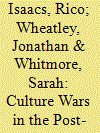|
|
|
Sort Order |
|
|
|
Items / Page
|
|
|
|
|
|
|
| Srl | Item |
| 1 |
ID:
180488


|
|
|
|
|
| Summary/Abstract |
In the last decade the term culture war has become hard to avoid. If it is not yet the buzzword of the first part of the twenty-first century, it soon will be. Culture wars seem to be around us everywhere. Each passing week brings some new mention of an outbreak in a public institution, civic space or political arena in some part of the globe. Culture wars are the phenomenon we cannot seem to shake. Battle lines are drawn, rhetorical tools are sharpened and social media awash with vitriol and moralising, and seemingly unbridgeable social gaps. If the immediate post-Cold War period did usher in an era of universal global liberalism, decades on it is now far in the distance, only visible in the rear-view mirror. Instead, around us lie social and political fault lines featuring competing visions of what should be the appropriate normative basis upon which societies should be constituted. They are debates that focus on belonging, on citizenship, on rights and identities.
|
|
|
|
|
|
|
|
|
|
|
|
|
|
|
|
| 2 |
ID:
067868


|
|
|
|
|
| Publication |
Aldershot, Ashgate, 2005.
|
| Description |
xi, 252p.hbk
|
| Series |
Post Soviet Politics
|
| Standard Number |
0754645037
|
|
|
|
|
|
|
|
|
|
|
|
Copies: C:1/I:1,R:0,Q:0
Circulation
| Accession# | Call# | Current Location | Status | Policy | Location | IssuedTo | DueOn |
| 050808 | 947.58086/WHE 050808 | Main | Issued | General | | RA57 | 29-Nov-2024 |
|
|
|
|
| 3 |
ID:
090417


|
|
|
|
|
| Publication |
2009.
|
| Summary/Abstract |
This article attempts to explain how the Georgian state sought to manage ethnic diversity at the same time as (re-)building state institutions within a (nominally) democratic framework, from the collapse of Soviet power to the present day. It is suggested that the explanation for the slow and uneven progress in accommodating national minorities within the Georgian state derives from four principal factors: first, the collapse of the Soviet state and the consequent inability of the newly independent state to provide basic public goods; second, the lack of a 'civic' model for the accommodation of minorities; third, the continuation of the Soviet norm of arbitrary exercise of power by leaders, which is ill-suited to accommodating diversity and resolving conflict; and, finally, the Soviet legacy of ethnofederalism, which carved out three autonomous territories - Abkhazia, Achara and South Ossetia - from within Georgia that would (violently, in the case of Abkhazia and South Ossetia) resist the encroachments of the new Georgian state, and would later (in the case of South Ossetia) provide a pretext for military conflict between Russia and Georgia.
|
|
|
|
|
|
|
|
|
|
|
|
|
|
|
|
| 4 |
ID:
180493


|
|
|
|
|
| Summary/Abstract |
The role of ideology in political competition in the former Soviet Union is under-researched. This essay uses public opinion data to identify and investigate patterns of political competition in Georgia. I find voters’ preferences on a range of issues to be underpinned by a latent cultural dimension of political ideology that concerns how citizens view the relationship between the Georgian nation and the rest of the world. I go on to present evidence that this dimension is, at least to some extent, both embedded in social structure and reflected in voting patterns.
|
|
|
|
|
|
|
|
|
|
|
|
|
|
|
|
|
|
|
|
|